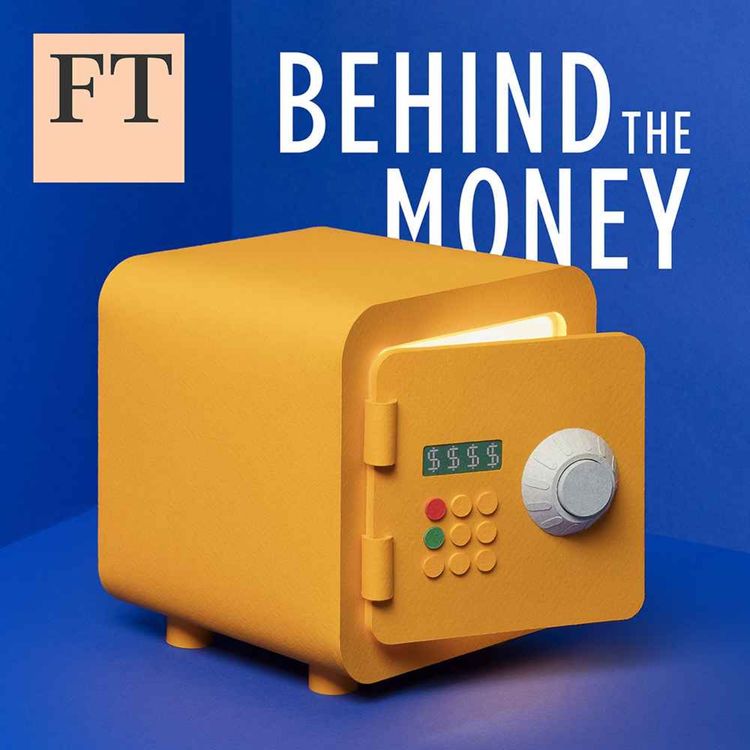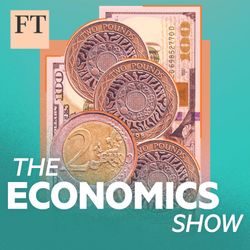Share

Behind the Money
Can Intel bounce back?
•
Silicon Valley legend Intel was the semiconductor chip industry’s global leader for decades. Lately it’s fallen behind, just as the US is recognising the importance of chips to economic and national security. Now, Intel is trying to turn itself round. The FT’s Richard Waters explains its plans and the many challenges it will face in order to reclaim that stature.
Clip from CNN
- - - - - - - - - - - - - - - - - - - - - - - - - -
For further reading:
Can Intel become the chip champion the US needs?
Intel: Chips Act subsidies may impede a return to former glory
- - - - - - - - - - - - - - - - - - - - - - - - - -
On Twitter, follow Richard Waters (@RichardWaters) and Michela Tindera (@mtindera07)
More episodes
View all episodes

Davos’ fight for relevance
22:19|Every January a collection of the world’s top business and political leaders head to the Swiss town of Davos for the annual meeting of the World Economic Forum. The event is a week of panels and networking meant to promote dialogue among elites. But a scandal last year threatened to overshadow the 2026 meeting, which begins in a few days. Critics have also questioned the event’s relevance in a changing world. The FT’s Switzerland and Austria correspondent, Mercedes Ruehl, explains the problems the WEF has faced and shares her reporting on how this year’s event is shaping up. Clips from the World Economic Forum, Instagram: @christinelagardeThe FT does not use generative AI to voice its podcasts.- - - - - - - - - - - - - - - - - - - - - - - - - - For further reading:Microsoft and McKinsey pay up to $1mn each to back Donald Trump’s Davos hub Davos assured Trump ‘woke’ topics were off the agendaThe Davos set in decline: can the World Economic Forum save itself?‘A family enterprise’: WEF founder Klaus Schwab on alleged wrongdoing at Davos - - - - - - - - - - - - - - - - - - - - - - - - - - Follow Mercedes Ruehl on X (@mjruehl), or on Bluesky (@mjruehl.bsky.social) Michela Tindera is on X (@mtindera07) and Bluesky (@mtindera.ft.com), or follow her on LinkedIn for updates about the show and more. Read a transcript of this episode on FT.com
Martin Wolf on the economy in 2026
21:27|From the artificial intelligence bubble to trade policy, Michela asks Martin Wolf, the FT's chief economics commentator, how the biggest stories of last year will affect the economy in 2026. The FT does not use generative AI to voice its podcasts.- - - - - - - - - - - - - - - - - - - - - - - - - - For further reading:Forecasting the world in 2026 Why the world should worry about stablecoinsTrump’s tariffs will damage the world- - - - - - - - - - - - - - - - - - - - - - - - - - Follow Martin Wolf on X (@martinwolf_). Michela Tindera is on X (@mtindera07) and Bluesky (@mtindera.ft.com), or follow her on LinkedIn for updates about the show and more.Read a transcript of this episode on FT.com
As digital scams surge, who’s responsible?
32:58|The surge in scams, phishing attacks and digital fraud is raising serious liability questions. So who should be doing more? In this live recording from this year’s FT Global Banking Summit, Michela poses that question to executives from Citi, KPMG and Open Banking Excellence. The conversation was recorded on December 2, 2025.The FT does not use generative AI to voice its podcasts.- - - - - - - - - - - - - - - - - - - - - - - - - - For further reading:We have to be able to hold tech platforms accountable for fraud The rise of deepfake scams — and how not to fall for oneAt Singapore’s anti-fraud convention, even the experts get scammed- - - - - - - - - - - - - - - - - - - - - - - - - - Michela Tindera is on X (@mtindera07) and Bluesky (@mtindera.ft.com), or follow her on LinkedIn for updates about the show and more.Read a transcript of this episode on FT.com
The Economics Show: What economics gets wrong about human behaviour, with Richard Thaler
34:04|Economists like to model people as rational creatures who make self-interested decisions. But humans don’t act that way. Why do investors, politicians and ordinary people act against their best interests – and how can they be nudged into making better decisions? To find out, FT economics commentator Chris Giles speaks to Richard Thaler, the founding father of behavioural economics. Thaler is a professor at the University of Chicago who won the 2017 Nobel Prize in Economics for his work on how humans make (often irrational) decisions.This is a repeat of an episode published on The Economics Show, a sister podcast of Behind the Money, on November 7, 2025. Subscribe to The Economics Show on Apple, Spotify, Pocket Casts or wherever you listen.Presented by Chris Giles. Produced by Mischa Frankl-Duval. Manuela Saragosa is the executive producer. Original music by Breen Turner. Sound design by Breen Turner and Samantha Giovinco. Our broadcast engineer is Andrew Georgiades.
The quiet success of Fidelity Investments
21:57|Despite its relatively low profile, Fidelity Investments is a sprawling beast when it comes to financial services. Last year, the firm’s revenues surpassed the world’s largest asset manager, BlackRock, by more than 50 per cent. The FT’s Emma Dunkley explains how Fidelity has come to dominate the sector, the secrets behind its success, and what hurdles it may have to jump through in the coming years as new challenges for asset managers arise. The FT does not use generative AI to voice its podcasts.- - - - - - - - - - - - - - - - - - - - - - - - - - For further reading:Can Fidelity keep its grip on America’s investments?The quiet queen of American financeHow Fidelity’s Ned Johnson defied the curse of the boss’s sonTrump opens US retirement plans to crypto and private equity investments- - - - - - - - - - - - - - - - - - - - - - - - - - Follow Emma Dunkley on X (@EmDunks). Michela Tindera is on X (@mtindera07) and Bluesky (@mtindera.ft.com), or follow her on LinkedIn for updates about the show and more.Read a transcript of this episode on FT.com
Whistleblowing in the UK, Ep. 2: Is it ‘British’ to pay whistleblowers?
19:36|In the UK, whistleblowers are encouraged to report wrongdoing, but often at cost to their livelihoods and careers. One solution would be to pay corporate whistleblowers for coming forward. However, many in government have held the idea for years that doing so is not very “British.” But now, longtime opposition to the idea seems to be shifting. Suzi Ring, the FT’s legal correspondent in London, explains how and why. Plus, we speak with Nick Ephgrave, the director of the UK’s Serious Fraud Office, who is taking inspiration from his decades spent with London’s Metropolitan Police Service to try to change the system. Clips from ITVIf you missed part one of this series, listen to it here. The FT does not use generative AI to voice its podcasts.- - - - - - - - - - - - - - - - - - - - - - - - - - For further reading:Should corporate whistleblowers get paid?Whistleblowers could earn millions as HMRC targets tax fraudUK SFO director pushes to pay whistleblowers and use covert tacticsCorporate whistleblowing in the UK needs a shake-up Read a transcript of this episode on FT.com- - - - - - - - - - - - - - - - - - - - - - - - - - Behind the Money host Michela Tindera is on X (@mtindera07) and Bluesky (@mtindera.ft.com), or follow her on LinkedIn for updates about the show and more.
Business Book of the Year: Author Stephen Witt on Nvidia’s rise
29:44|In this special episode of Behind the Money, the FT’s senior business writer Andrew Hill interviews author Stephen Witt about his book The Thinking Machine: Jensen Huang, Nvidia, and the World’s Most Coveted Microchip. Witt and his book won the FT and Schroders Business Book of the Year for 2025. The FT does not use generative AI to voice its podcasts.- - - - - - - - - - - - - - - - - - - - - - - - - - For further reading:In future ‘books could respond’ says winning author Stephen Witt FT and Schroders Business Book of the Year 2025 — the shortlist FT and Schroders Business Book of the Year 2025 — the longlist Read a transcript of this episode on FT.com- - - - - - - - - - - - - - - - - - - - - - - - - - Follow Andrew Hill on X (@andrewtghill) or on Bluesky (@andrewtghill.ft.com) and Stephen Witt (@stephenwitt) on X. Michela Tindera is on X (@mtindera07) and Bluesky (@mtindera.ft.com), or follow her on LinkedIn for updates about the show and more.
Whistleblowing in the UK, Ep. 1: The cost of speaking up
30:21|For years, corporate whistleblowers in the UK have found themselves in an unenviable predicament. They’re encouraged to report wrongdoing, but at the same time they often feel like they’ve risked everything: their careers and livelihoods in exchange for little. In this special two-part series, we explore why critics think this system is failing whistleblowers and what the UK can do to change things.In part one: We hear from two whistleblowers who share why they blew the whistle and what went wrong after. Plus, the FT’s financial regulation editor Martin Arnold and Mary Inman, the attorney who represented well-known whistleblowers such as Frances Haugen of Meta and Tyler Shultz of Theranos, discuss the systemic issues whistleblowers have faced in the UK. Part two airs next Monday, December 15.The FT does not use generative AI to voice its podcasts.- - - - - - - - - - - - - - - - - - - - - - - - - - For further reading:Should corporate whistleblowers get paid?Whistleblowers could earn millions as HMRC targets tax fraudCorporate whistleblowing in the UK needs a shake-upAsset management: inside the scandal that rocked GAM - - - - - - - - - - - - - - - - - - - - - - - - - - Behind the Money host Michela Tindera is on X (@mtindera07) and Bluesky (@mtindera.ft.com), or follow her on LinkedIn for updates about the show and more.Read a transcript of this episode on FT.com
Coming soon: The cost of corporate whistleblowing in the UK
01:01|For years, corporate whistleblowers in the UK have found themselves in an unenviable predicament. They’re encouraged to report wrongdoing, but at the same time they often feel like they’ve risked their livelihoods in exchange for very little in the end. The fallout from whistleblowing can cost them their careers or worse. Starting next Monday, Behind the Money is launching a two-part special series on what, if anything, the UK can do to change this. Listen every Monday on Behind the Money.